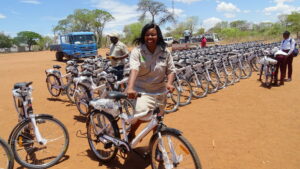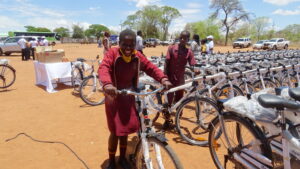Pamenus Tuso
Hwange -Andile Sibanda (13) from rural Dete in Matabeleland North province just cannot believe her luck.
Back in the village where she comes from, you can count the number of people who own bicycles on just one hand.
And these are adults who have toiled to buy a second-hand two-wheeler or paid a fortune for a new one.
Andile is now a proud owner of a bicycle, and she or her guardians did not have to pay a single cent for it.
Whereas the adults in her neighbourhood use theirs to travel for meetings, carry fellow villagers to a far-off clinic or simply visit the nearest shopping centre during their spare time, Andile’s bicycle has a different purpose.
A learner at St Francis Xavier Primary School in Dete, her newly found bicycle is supposed to ease the daily distance she has to travel from home to school and back.
Her two-hour journey to and from involves navigating dangerous terrain frequented by dangerous wildlife.
The International Fund for Animal Welfare (IFAW) has donated 125 bicycles, valued at $22,000, to vulnerable schoolchildren living over five kilometres from their schools.


Bicycles donated by IFAW
The IFAW, a non-profit organisation, works to bridge the gap between wildlife conservation and community welfare and strives for co-existence and sustainable development.
The donation, part of IFAW’s broader conservation efforts, also included educational books and targeted 11 schools in Hwange, Kusile, and Tsholotsho districts, including St Francis, Lupote, Mabale, and Thokoza primary Schools.
“I am happy that my school life is now going to be easier following this bicycle gift from IFAW,” said Andile during an interview in the presence of her uncle, Isaac Nyoni.
“I travel a distance of more than five kilometres to school. Most of the time, I arrived at school exhausted and could not learn properly,” added Andile.
Future Moyo (15) from Magoli village in the same district shared similar challenges and hardships she faced commuting to school before receiving a bicycle.
“I come from Magoli village, which is about seven kilometres away from school. Every morning, I used to wake up as early as 5 am so that I could be at school on time,” said Future who spoke in the presence of her mother.
“To make matters worse, the paths I use are frequented by dangerous wildlife. Now I am determined to pursue my education without any worries,” added Moyo.
St Francis headmaster, Nicholas Siameka, praised the initiative, saying the bicycles would reduce absenteeism and improve academic performance.
“A number of school children have not been coming to school regularly due to the long distances they walk. We hope these donations will translate to improved pass rates in our schools,” said Siameka.
Schools in Matebeleland North have historically struggled in national examinations, with government data revealing that 51 schools failed to produce a single pass at Grade 7 in 2023.
Student absenteeism and fatigue caused by commuting over long distances have been identified as key factors contributing to low pass rates.
At a recent handover ceremony, the IFAW country director, Alleta Nyahuye, said the cycles were part of a broader initiative to address community needs in line with the conservation projects they were implementing.
“Working hand-in-hand with ZimParks, we firmly believe that the success of conservation initiatives hinges on the active involvement of local communities.
“Their voice and aspirations must be at the forefront of our efforts, as we recognise that ignoring their needs can undermine even the most well-intentioned conservation projects,” said Nyahuye.
He added that the bicycles would significantly improve the children’s mobility and access to education.
“This initiative aims not only to ease the children’s daily trips but also to foster a harmonious relationship between local people and wildlife.
“By providing these bicycles, we aspire to empower these young individuals, helping them become future champions of conservation,” he said.
The Hwange district schools inspector, Lawrence Matshazi, announced plans for a cycling training programme to ensure children ride safely.
“To complement this gesture, the ministry will next year embark on a training program for cyclists. They should know how to properly ride bicycles. As a ministry (Primary and Secondary Education), we really support such programmes, which empower school children,” said Matshazi.
The bicycles were allocated to schools under the environmental stewardship programme that IFAW is jointly implementing with Zimparks in buffer communities in Hwange National Park.
The 11 schools that received the bicycles are part of the 21 schools under the stewardship programme.
The hand-over was a follow–up to the initial distribution of another 125 bicycles that was made early this year to schools in communities mostly affected by human-wildlife conflict.
According to the Ministry of Primary and Secondary Education, Matebeleland North has a total of 632 primary schools and 217 secondary schools.


Comments are closed.